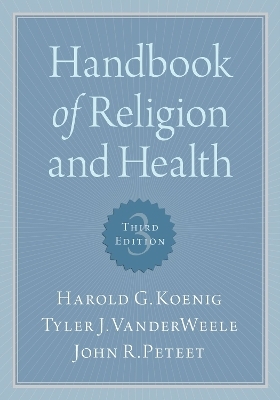
Handbook of Religion and Health
Oxford University Press Inc (Verlag)
978-0-19-008885-9 (ISBN)
The Handbook of Religion and Health has become the seminal research text on religion, spirituality, and health, outlining a rational argument for the connection between religion and health. For the past two decades, this handbook has been the most cited of all references on religion and health. This Third Edition is the most scientifically rigorous edition to date, covering the best research published through 2021 with an emphasis on prospective studies and randomized controlled trials.
This volume examines research on the relationship between religion and health outcomes, surveys the historical connections between religion and health, and discusses the distinction between the terms ''religion'' and ''spirituality'' in research and clinical practice. It reviews research on religion and mental health, literature on the mind-body relationship, and develops a model to explain how religious involvement may impact physical health through the mind-body mechanisms. It also explores the direct relationships between religion and physical health, covering such topics as immune and endocrine function, heart disease, hypertension and stroke, neurological disorders, cancer, and infectious diseases; and examines the consequences of illness including chronic pain, disability, and quality of life. Additionally, most of its 34 chapters conclude with clinical and community applications making this text relevant to both health care professionals and clergy.
This book is the most insightful and authoritative resource available to anyone who wants to understand the relationship between religion and health.
Harold G. Koenig is Professor of Psychiatry & Behavioral Sciences, Associate Professor of Medicine and Director of Center for Spirituality, Theology and Health at Duke University Medical Center. He is also Adjunct Professor in the Department of Medicine at King Abdulaziz University in Jeddah, Saudi Arabia and Adjunct Professor of Public Health at Ningxia Medical University in China. Tyler J. VanderWeele is John L. Loeb and Frances Lehman Loeb Professor of Epidemiology in the Departments of Epidemiology and Biostatistics at Harvard T.H. Chan School of Public Health and Director of the Human Flourishing Program in the Institute for Quantitative Social Science at Harvard University. John R. Peteet is Associate Professor of Psychiatry at Harvard Medical School and Dana-Farber Cancer Institute and Brigham and Women's Hospital.
Foreword (Howard Koh)
Preface (Jeff Levin)
Introduction
I. Research Methodology
1. Definitions
2. Measurement
3. Research design
II. Mental Health
4. Coping with stress
5. Depression
6. Bipolar disorder
7. Suicide
8. Anxiety
9. Schizophrenia and other psychoses
10. Substance use
11. Personality traits and disorders
12. Psychological well-being and positive emotions
III. Social Health
13. Delinquency and crime
14. Marital and family stability
15. Social support
IV. Explanatory Mechanisms: Mental and Social Health
16. Understanding the religion, mental, and social health relationship
V. Health Behaviors
17. Cigarette smoking
18. Exercise
19. Diet and weight
VI. Physical Health
20. Heart disease
21. Hypertension
22. Cerebrovascular disease
23. Alzheimer's disease and other dementias
24. Immune function
25. Stress hormones
26. Cancer
27. Mortality
28. Physical disability
29. Chronic pain
30. Disease detection and prevention
VII. Explanatory Mechanisms: Physical Health
31. Understanding the religion-physical health relationship
VIII. Public Health and Health Policy
32. Public health and human flourishing
33. Health policy implications
IX. Conclusions
34. Summary and conclusions
Appendix. Studies on religion and health (by health outcome)
References
Index
| Erscheinungsdatum | 11.11.2023 |
|---|---|
| Verlagsort | New York |
| Sprache | englisch |
| Maße | 256 x 187 mm |
| Gewicht | 2191 g |
| Themenwelt | Medizin / Pharmazie ► Medizinische Fachgebiete ► Medizinethik |
| Studium ► Querschnittsbereiche ► Geschichte / Ethik der Medizin | |
| ISBN-10 | 0-19-008885-0 / 0190088850 |
| ISBN-13 | 978-0-19-008885-9 / 9780190088859 |
| Zustand | Neuware |
| Informationen gemäß Produktsicherheitsverordnung (GPSR) | |
| Haben Sie eine Frage zum Produkt? |
aus dem Bereich


